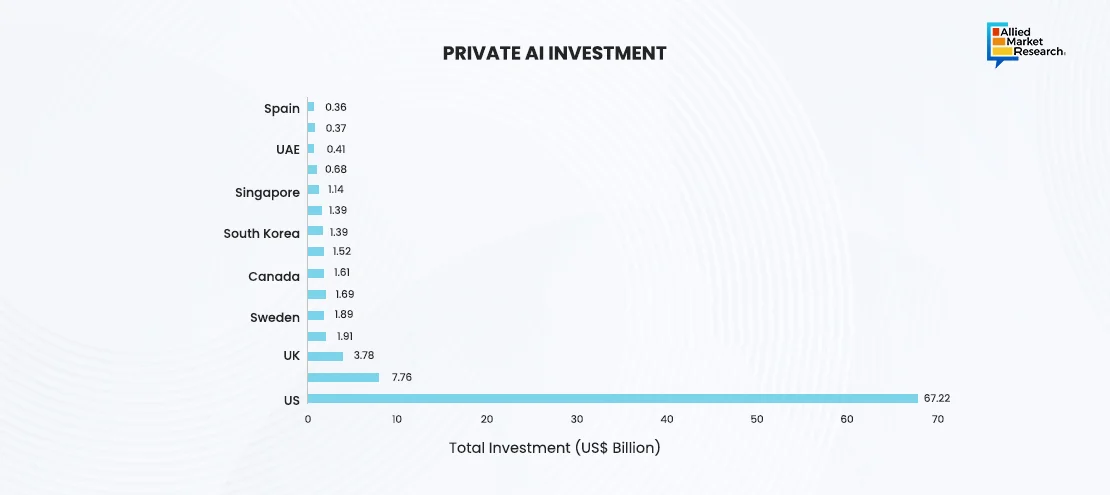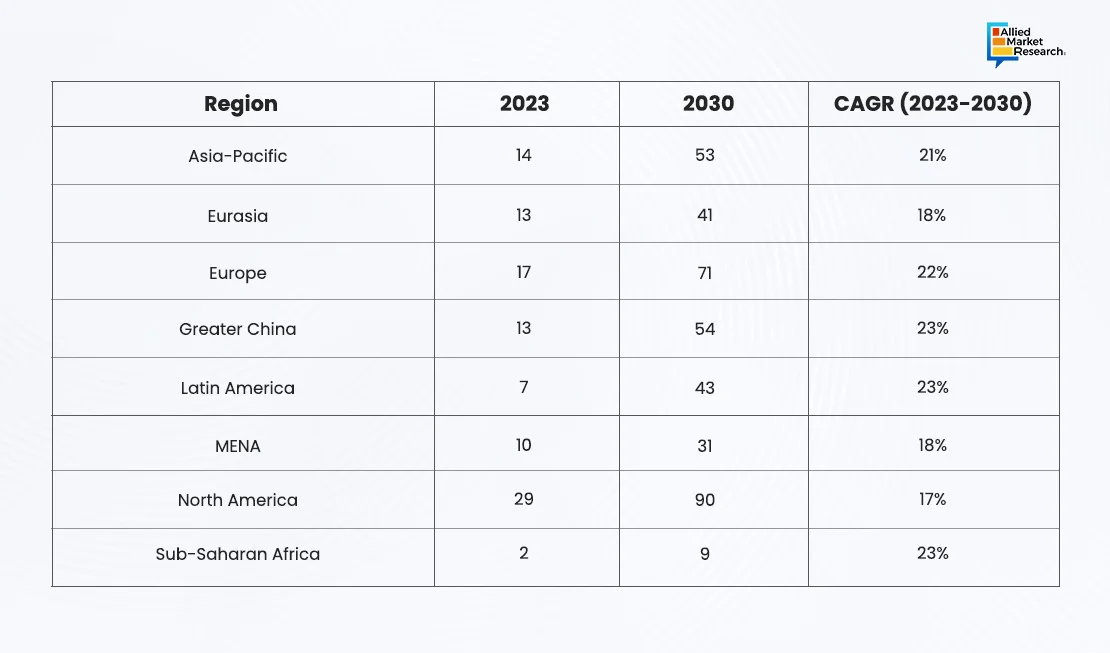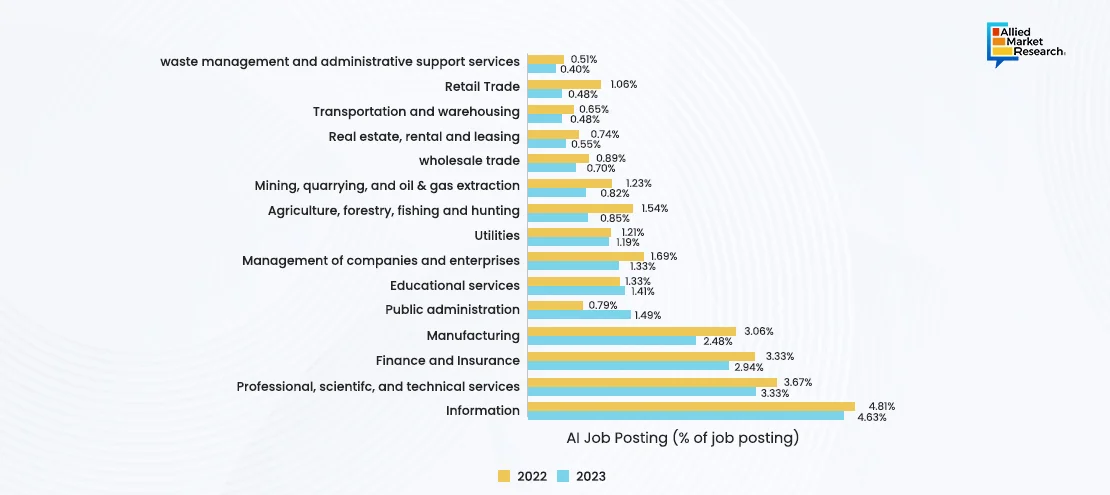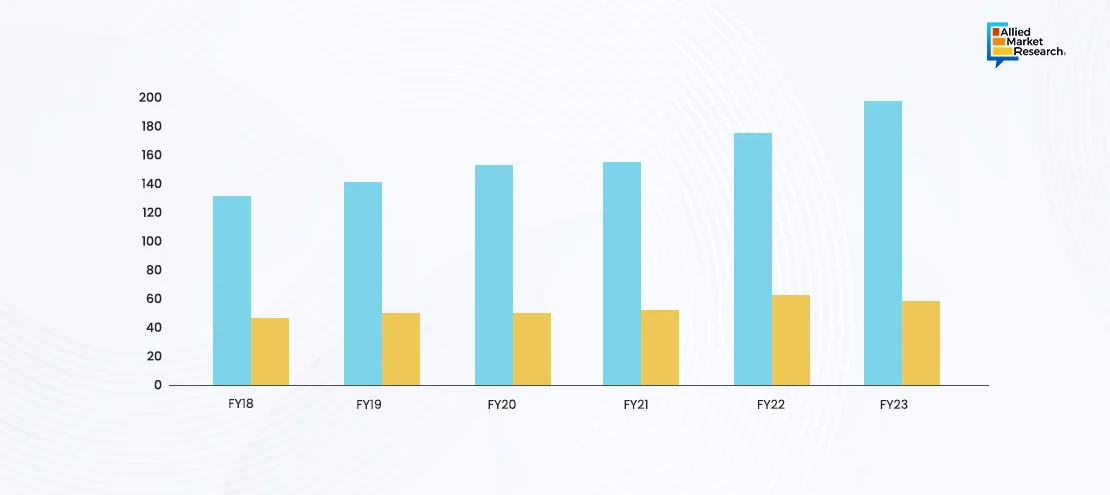Industry Review 2024: Surge in Technology Investments within the ICT Sector

The information and communications technology (ICT) sector, over the years, has experienced tremendous growth owing to huge investments across technologies such as cloud computing, artificial intelligence, and Internet of Things amongst others. For instance, in January 2023, Microsoft Corporation announced an investment of US$ 10 billion in OpenAI, which has highly impacted the OpenAI revolution of ChatGPT in 2024. Similarly, the healthcare industry giant Roche, in September 2024, announced its investment in digital pathogen open environment through the integration of 20 advanced AI algorithms. This advance is expected to assist in cancer research and diagnosis by utilizing AI technology. The table below shows the private investments in AI by countries:
Additionally, mobile connectivity remained an important factor in the growth of the global digital economy. According to Global System for Mobile communications Association (GSMA) by the end of 2023 there were more than 5.6 billion people across the globe with a mobile subscription. This subscription and internet penetration is further expected to increase over the years owing to the rise in demand for IoT devices. The table below predicts the mobile data traffic per connection by 2030 as per GSMA:

North America Leading the Technology Industry
In the global technology sector, North America leads in technology innovation, setting trends for the future. Some of the most significant technology businesses in the world, including industry titans like Apple, Microsoft, Google, and Amazon, are based in the region. Together, they have raised the bar in fields like cloud computing and artificial intelligence . With 40% of global spending on IT services and products coming from the US alone, North America has dominated the global technology industry in 2024. The region dominates global R&D investment, contributing nearly one-third of the total, alongside its significant economic influence.

Artificial intelligence is one of the most prominent fields where North America is leading the way. In addition to creating state-of-the-art AI technologies, American firms—particularly OpenAI, Google DeepMind, and NVIDIA—are influencing the worldwide AI policy environment. This rise in investment across AI technology by several industries is in turn increasing the demand for skilled AI laborers across the globe. The table below shows the demand for AI related job posting across US in 2023.
The overall number of new AI job listings rose in April,2024, increasing by 7% from March and by over 30% from the start of the year. The proportion of AI jobs to all software employment rose from about 5.3% to about 6.4% in April 2024 compared to March 2024, continuing a general upward trend that began in 2023. This suggests that the recruiting market for AI is far more active than the hiring market for IT.

North American businesses are also at the forefront of cloud computing. As of 2024, Amazon Web Services (AWS), the company's cloud computing division, is expected to account for 32% of the global market. While Microsoft's Azure is a strong rival with about 21% of the market. Additionally, with firms like Google LLC and IBM Corporation making notable advancements in the sector, the United States is also at the forefront of the development of quantum computing. In the competition for useful quantum computing, IBM's quantum project, which introduced a 127-qubit quantum processor, marks a significant advancement in the industry in 2024.
Asia-Pacific to Grow Significantly over the years
With nations like China, Japan, South Korea, and India spearheading significant breakthroughs and developments in a variety of fields, the Asia-Pacific (APAC) region is quickly becoming a global leader in the technology sector. APAC plays a key role in production and technical advancement, with significant growth in manufacturing, consumer electronics, AI, telecommunications, and e-commerce. China alone is expected to contribute over $350 billion to global IT investments by 2024, making up almost 50% of all technology spending worldwide. Strong government regulations, significant R&D expenditures, and a growing startup scene all contribute to the region's explosive growth and establish it as a major force in the global tech scene.
Huawei, Alibaba, and Tencent are leading tech innovations, helping China become a major tech powerhouse. Huawei, a global leader in telecommunications equipment, has played a key role in implementing 5G networks with its advanced infrastructure for next-generation wireless communication. Huawei is still in the lead for 5G patents and is still a major force in the global telecom market, despite opposition from the West. In a similar vein, Alibaba Cloud, its cloud computing division, has expanded quickly, positioning China as the world's second-largest player in the cloud computing space. By 2024, Alibaba Cloud is expected to own around 9% of the global market.
India, on the other hand, is becoming a significant force in software development, artificial intelligence, and e-commerce because to its quickly expanding digital economy. Some of the biggest IT outsourcing firms in the world, like Infosys and Tata Consultancy Services (TCS), are based in the nation and play an important role in the global market for IT services. According to the National Association of Software and Services Companies (NASSCOM), the Indian IT industry recorded a revenue of US$ 277 billion in FY22 showcasing an 15.5% growth rate over the years. IT exports across the country also experienced a growth of 9% in the financial year 2023. The table below shows the revenue growth of IT-BPM sector across India:
Key Technology Trends Shaping 2024 and Beyond
In 2024, the technology sector has shaped the future, driven by rapid innovation, increasing digital integration, and a growing global reliance on tech-based solutions. Businesses are expected to grow even more in the ensuing decades, changing all facets of human existence and reshaping world economies. It’s expected that the expansion will be fueled by several significant trends and advancements, further strengthening the role of technology as a major social force.

The development of machine learning and artificial intelligence has been one of the most revolutionary trends in 2024. Advancing technologies are driving innovation across industries such as healthcare, finance, manufacturing, and education. Simultaneously, AI-powered solutions are revolutionizing supply chains, enhancing personalized learning, improving medical diagnoses, and even creating art. AI's influence on productivity and problem-solving is expected to increase as it becomes more widely available and incorporated into other applications, encouraging innovation in a variety of sectors.
The rise of the Internet of Things is another important growth factor. Devices have become more interconnected, while automation and data-driven decision-making have unlocked even greater potential. For instance, smart cities are using IoT to enhance urban living, save energy costs, and streamline transit networks. IoT-enabled gadgets are improving efficiency and convenience in households. This trend is being further accelerated by the spread of 5G networks, which provide the high-speed connectivity needed to accommodate an increasing number of devices and apps.
Another field with enormous promises is the metaverse. This new digital ecosystem, powered by the fusion of blockchain, augmented reality, and virtual reality, is transforming entertainment, business, and social interaction, unlocking endless possibilities. Companies are making significant investments in creating virtual offices, immersive experiences, and decentralized financial systems, which raises the possibility that the metaverse can eventually serve as a hub for a variety of human endeavors.
Furthermore, the limits of what is computationally feasible are being redefined by developments in quantum computing. Despite its early stages, quantum technology has the prospects to transform fields like drug development, materials research, and encryption by solving intricate problems at unprecedented speeds. The way that technology develops in the future will likewise be greatly influenced by sustainability. Greener, more energy-efficient solutions are being developed by businesses because of resource shortages and climate change. Renewable energy innovations like energy storage systems and sophisticated solar panels are becoming more popular. Blockchain and other technologies are also being used to improve supply chain traceability and transparency, which lowers waste and encourages moral behavior. In addition to addressing environmental issues, the move to sustainable technology creates new opportunities for expansion and investment in the industry.
However, there are drawbacks to this expansion, such as workforce adaptation, ethical conundrums, and cybersecurity dangers. Ensuring data privacy and tackling cybercrime is essential as technology has become more widespread. Likewise, clear regulations and public dialogue are needed to address AI biases and the ethical impacts of automation.
The Endnote
Global innovation in 2024 has been transformed by groundbreaking advancements across various industries. With the release of OpenAI's GPT-5 in March 2024, artificial intelligence advanced to new heights, propelling advances in automation and natural language processing. IBM's June release of its 1,500-qubit quantum processor marked a significant advancement in quantum computing, speeding up research in fields including medicine development and cryptography. With the April release of their next-generation solar roof technology, Tesla made it possible to integrate renewable energy more intelligently with AI-powered energy infrastructures. Similarly, Waymo's expansion of commercial self-driving services to 15 additional U.S. cities by September demonstrated how autonomous vehicle developments were becoming commonplace in the automobile sector. These achievements demonstrate that 2024 has been a year for creativity, teamwork, and the real-world application of cutting-edge technologies.



